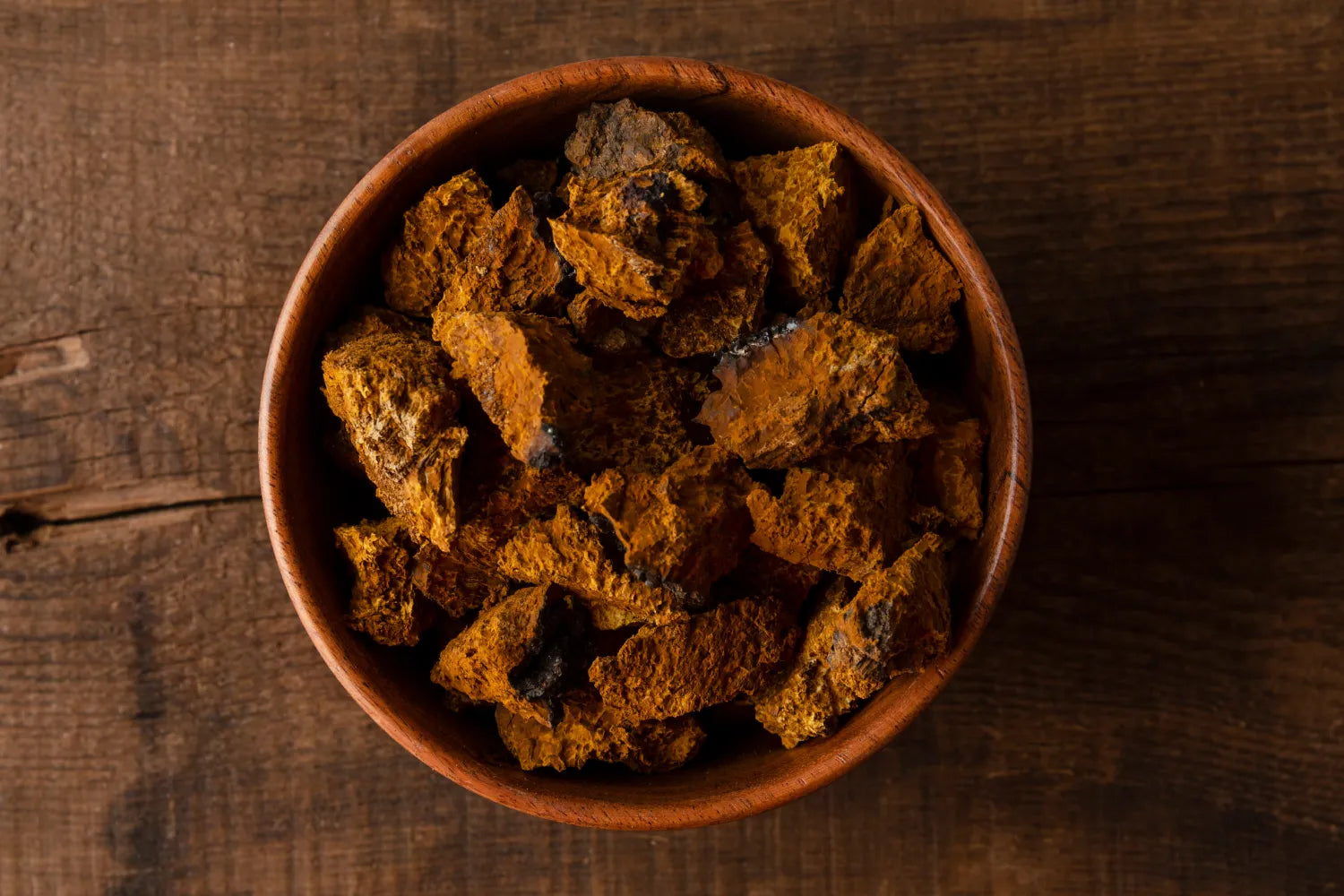How Much Chaga Per Day? A Dosage Guide

If you’ve been in the wellness space for a while, you may have seen plenty of trends come and go. Many popular wellness ingredients are just fads, but every now and then, we strike gold with an ingredient that lives up to its hype. One of these ingredients is chaga mushroom.
If you’re interested in experiencing the benefits of chaga for yourself, you might be wondering how much you should take. Here’s everything you need to know about chaga mushroom, its benefits, and how much to take.
What Is Chaga Mushroom?
Chaga mushroom (known formally as Inonotus obliquus) is a medicinal mushroom that grows on trees in North America, Eastern Europe, and Asia. This fungus seems to prefer colder climates, and winter is actually the best time to forage wild chaga because that is when it is most noticeable.
The fruiting body of the mushroom, or the part that most people would call the mushroom, is black and rough-looking. It resembles a piece of coal growing out of the side of a tree.
Chaga mushroom was used for multiple medicinal purposes in folk Russian medicine, and was included in the Shen-nung pen ts'ao ching, the first materia medica in Traditional Chinese Medicine (TCM). This text refers to chaga as “The King of the Herbs.”
Because of its many benefits, we’ve decided to highlight chaga mushroom in our Mushroom Coffee+ powder. Alongside chaga mushroom are lion’s mane for focus, L-theanine to support feelings of relaxation, coffee extract for energy, and collagen protein to support gut health.
What Are the Health Benefits of Chaga?
Chaga mushroom has clearly been in use for hundreds of years, but what exactly are the health benefits? Like many herbs used in TCM and other ancient healing arts, science is only just now confirming the benefits humans have been aware of for ages. Here are some of the most recent discoveries about chaga mushroom.
Supports the Immune System
Having a properly working immune system depends on having a properly working immune response. Normally, our immune systems evaluate threats and respond appropriately. However, sometimes, the immune system overreacts. There are also times when the threats linger in our bodies for so long that even a healthy immune response does more harm than good.
Chaga helps support a healthy immune response and can minimize irritation in the body. Additionally, some studies are now suggesting that chaga can support health and wellness for the long term.
Encourages Healthy Blood Sugar Levels
Chaga mushroom may encourage healthy blood sugar levels, which could be great for those with occasionally unstable blood sugars. That said, research into this benefit is still in its early stages, and currently chaga’s effects on blood sugar are only being tested in mice.
Supports Healthy Cholesterol Levels
There are two major types of cholesterol: LDL (bad) cholesterol and HDL (good) cholesterol. Even though only one is referred to as “bad,” these cholesterols still need to stay within certain levels to be considered healthy.
Chaga can help support balanced levels of cholesterol in healthy individuals. Over time, this can also support long-term heart health.
Promotes Long-Term Wellness
Chaga also contains antioxidants, which are molecules that have extra electrons. They use these electrons to help neutralize free radicals, which are unstable molecules that are missing electrons.
If allowed to go unchecked, free radicals can wreak massive damage to the body. Free radical damage even plays a large part in long-term wellness, contributing to some signs of aging and overall deterioration of health.
How Much Chaga Should You Take?
When it comes to how much chaga you should take, there are no rules. There are no studies out there that show which concentration of chaga is best.
On top of that, chaga mushroom isn’t something our bodies physically need a certain amount of to survive. Because of this, there are no nationally recognized recommendations on how much to take like what you’d find with vitamins and minerals.
With all of this in mind, there are a few ways you can make sure you’re taking the right amount of chaga for you. First, start with the recommended dosage of your supplement of choice. For instance, Everyday Dose Mushroom Coffee+ is measured in scoops.
Second, see how you feel after you take it. Start with a small amount, and slowly adjust how much you take to find a balance that works for you.
Note: Those with kidney problems should avoid chaga because of its high oxalate content.
What Should You Look For in a Chaga Supplement?
Not all chaga supplements are created equal. There are two main things you’ll want to pay attention to: what part of the mushrooms are used and how they are prepared.
Most supplements use mycelium, which is the root-like system of the mushroom. Mycelium has great benefits, but it isn’t quite as high in health-supporting properties as the fruiting body, which is the part of the mushroom we’re used to seeing. Some supplements even use a mixture of the two. At Everyday Dose, we use 100 percent fruiting bodies in our mushroom blends.
Many supplements also use mushrooms that have been ground into a powder. Many of the helpful compounds in mushrooms are not naturally bioavailable, so simply eating a mushroom (or powdered mushroom, in this case) probably won’t provide the benefits you’re looking for.
Instead, try mushroom extracts. These are made by soaking the mushroom in alcohol to extract the beneficial compounds. The end result is concentrated mushroom power that your body can actually use.
Are There Any Side Effects of Taking Chaga?
There are no known side effects of taking chaga, but that doesn’t mean that you shouldn’t exercise caution when you take it. Just like you would any other supplement or food, monitor how you feel after taking chaga, and make a note of any symptoms that could indicate an allergic or intolerant reaction.
If you have diabetes or a blood clotting disorder, you should talk to your healthcare provider before you take chaga. This is especially true if you take any medications. Many herbal remedies are incredibly powerful and should be treated with as much respect as medicine.
Finally, if you are pregnant or breastfeeding, ask your doctor before you start taking chaga mushrooms. We currently don’t know how chaga affects breast milk or pregnancy, so it may be best to exercise caution.
Final Words
Chaga is a functional mushroom that grows in cold climates across North America, Europe, and even Asia. Its benefits include supporting the immune system, encouraging healthy blood sugar levels, supporting healthy cholesterol levels, and promoting long-term wellness.
Chaga has been called the “King of Herbs,” and we couldn’t agree more — that’s why it’s one of the key ingredients in our Mushroom Coffee+. To learn more about the wonders of mushroom coffee, visit the Everyday Dose blog today.
Sources:
4 Benefits of Chaga Mushrooms | Cleveland Clinic
5 Reasons to Consider Chaga Mushrooms | American Association of Naturopathic Physicians








